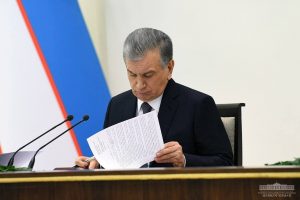Uzbekistan and Turkmenistan were the only Central Asian states whose militaries did not put boots onto Kazakhstan’s soil as a result of crisis that started on January 2. Turkmenistan maintains a neutral foreign policy, and Uzbekistan has a decidedly inward-looking military doctrine that is fully focused on domestic security without any space for foreign military activities. Kazakhstan’s other neighbors are Collective Security Treaty Organization (CSTO) members and contributed forces to the short-term mission, the first since the organization’s creation in 1992. They spent several days there until Kazakh authorities announced the stabilization of the situation and requested an end to the CSTO mission.
Uzbekistan has a passive military policy that forbids the government from participating in military coalitions, hosting any foreign military troops, using force against other countries, or even participating in peacekeeping missions. Nevertheless, Kazakhstan and Uzbekistan are strategic partners and Kazakhstan is an important trade partner for Uzbekistan — its third largest after China and Russia.
Tashkent intensely observed the developments in Kazakhstan and was far from being indifferent. Uzbek President Shavkat Mirziyoyev cut his regular week-long vacation short. While the Uzbek military has not stepped onto Kazakh soil, Uzbek diplomacy has been in full swing.
The Uzbek Ministry of Foreign Affairs issued a statement on January 5 to its Kazakh neighbors expressing confidence that the country would be able to stabilize the situation without outside interference. “We believe that the people of Kazakhstan have enough determination and will to maintain mutual understanding, restore peace and stability in the country and solve the problems on their own,” the statement proclaimed.
It is unclear whether Tashkent offered any practical advice through other channels, but the Ministry of Foreign Affairs was blunt in “asking” Kazakhstan to avoid requesting outside assistance from the CSTO. Uzbekistan was most likely motivated by a desire not to see Russia’s military presence expand to yet another neighboring country. Moscow already has military bases in Kyrgyzstan and Tajikistan and Tashkent perhaps feared that Kazakhstan would come out of a temporary deployment with a permanent Russian military presence.
As it turned out, the foreign ministry had little understanding of the developments on the ground. Within several hours of the statement, it turned out that a “determination to solve the problems on their own” was absent within Kazakhstan’s armed forces. While it remains unclear precisely what happened, some reports suggest that the Kazakh security forces did little to maintain security in Almaty, for example, over the course of several critical hours, perhaps illustrating a lack of obedience to the sitting president, Kassym-Jomart Tokayev.
Possibly offended at Uzbekistan’s statement urging Kazakhstan to keep outside forces from entering the situation, Belarusian President Alexander Lukashenko bluntly said that Uzbekistan should learn lessons from the events in Kazakhstan, otherwise it will be the next country to witness similar developments.
In response, Mirziyoyev brushed off Lukashenko’s prophecy and said his country is vigilant about the security situation in the region and in the country and always prepared to respond to threats. “We are closely monitoring the situation in the region, all the threats to security. We have enough strength and potential to respond appropriately to any threat and strike.”
Lukashenko’s statement was an opportunity to put pressure on Uzbekistan to once again rejoin the CSTO. Uzbekistan was a member of the organization twice, from 1994-1999 and 2006-2012.
For Lukashenko it was also an opportunity to raise the importance of Russia and the CSTO as regional stabilizers and celebrate the first successful employment of the organization in 30 years. It is unlikely that Lukashenko has any unique information about political instability in Uzbekistan. Mirziyoyev’s response suggests that Tashkent believes it has full control of the internal situation.
Two conclusions follow from the events in Kazakhstan. First, Tashkent is categorically against any military alliances at its border and therefore, did not mince its words to express that directly through advising Kazakhstan to stabilize the situation without outside interference. Second, individual CSTO members are ready to question Mirziyoyev’s legitimacy in order to create pressure for Uzbekistan to rejoin the CSTO.
































